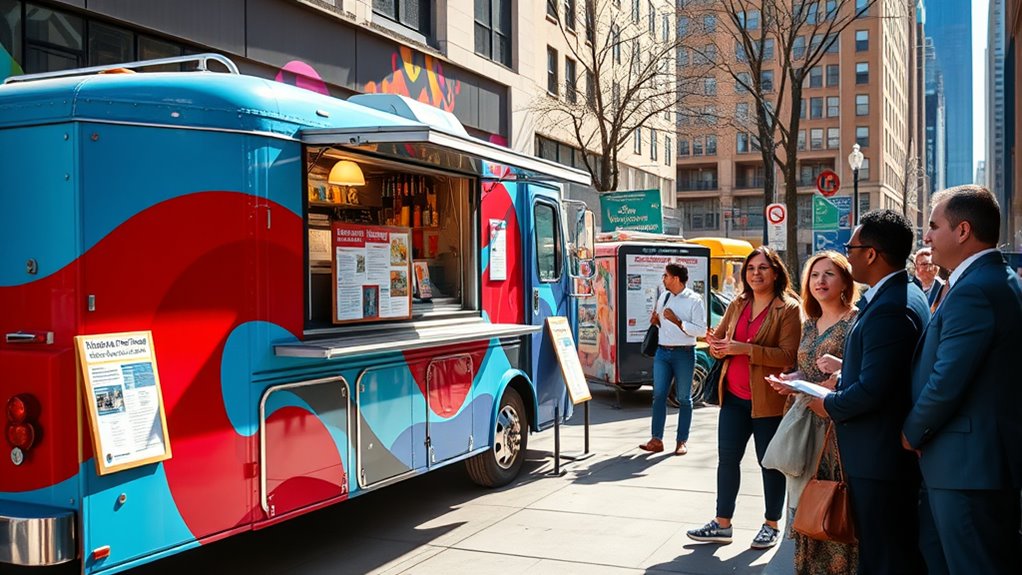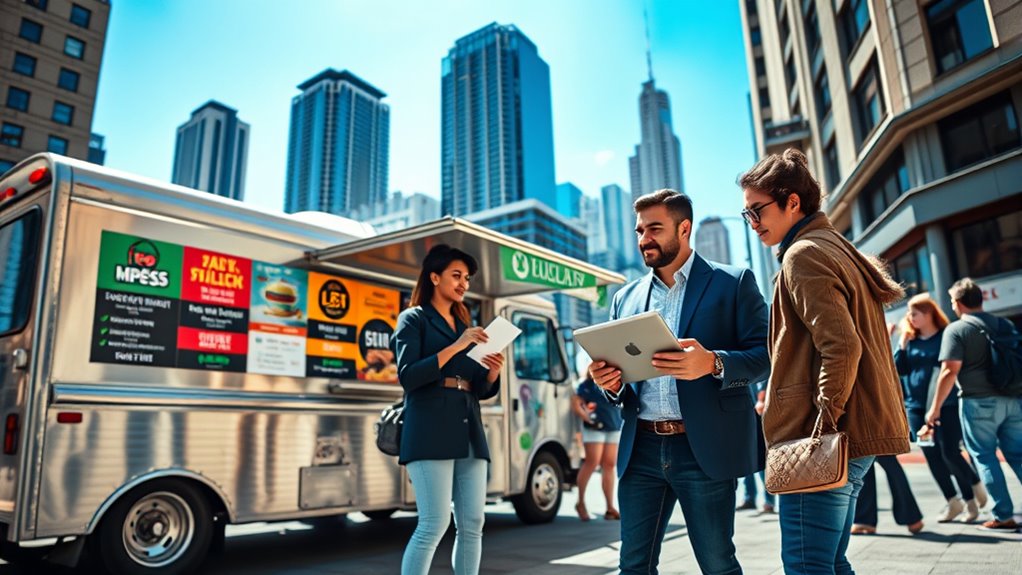To fund your food truck, consider using your savings, applying for small business loans or microfinancing, and exploring grants or local incentives. You can also seek investor partnerships, crowdsource through platforms like Kickstarter, or build vendor credit to manage supplies. Equipment leasing and vendor credit lines can lower upfront costs, while government programs might offer tax credits or grants. Continuing will reveal all the options to help you start your food truck journey confidently.
Key Takeaways
- Personal savings, grants, and community support are accessible options that avoid debt and offer full control over the business.
- Small business loans, microfinancing, and vendor credit lines help manage cash flow and fund equipment and supplies.
- Equipment leasing and alternative partnerships reduce initial costs and enhance exposure through sponsorships and co-branding.
- Investor partnerships, including angel and venture capital, provide significant capital with strategic support for growth.
- Government incentives like grants, tax credits, and local grants can reduce startup costs and encourage community development.
Personal Savings and Out-of-Pocket Funds

Using your personal savings is the most straightforward way to finance your food truck startup because it gives you quick access to funds without the complexity of loans or investors. Typically, startup costs range from $40,000 to $300,000, covering the truck, equipment, permits, and initial supplies. Paying out of pocket helps you avoid debt and interest payments, giving you full control over your business decisions. It also simplifies the process since you won’t need to go through loan approvals or investor negotiations. Your savings can cover major expenses like purchasing or leasing a truck, outfitting the kitchen, and obtaining permits. However, relying solely on savings requires a substantial reserve to ensure your business can operate smoothly without external financing, especially during early months when cash flow is tight. Maintaining a financial cushion is essential to handle unexpected costs or slow sales periods, and understanding the initial startup costs involved can help you plan more effectively.
Small Business Loans and Microfinancing Options

Small business loans and microfinancing options can provide essential funding to launch your food truck when personal savings fall short. SBA loans, like the 7(a) and Microloan programs, are common choices. To qualify, your business must be a for-profit entity in the U.S. with owner-invested equity, and you’ll need detailed business plans and financial documents. Microloans are ideal for smaller amounts, typically up to $50,000, and have less strict requirements, focusing on your business potential and experience. Most lenders require a minimum credit score around 550, along with bank statements, tax returns, and permits. Be prepared to offer collateral and a personal cash injection of 10-20%. The Huntington National Bank is the leading SBA lender in the food truck sector with 86 loans averaging $67,871, based on data from 2018–2023. Matching the loan type to your needs ensures better repayment terms and smoother funding for your food truck startup.
Equipment Financing and Leasing Solutions

When choosing between leasing and loans for your food truck equipment, you’ll want to weigh the upfront costs, long-term expenses, and ownership benefits. Leasing offers lower initial payments and easier upgrades, while loans let you own the equipment outright after payments end. Understanding the application process helps you select the best financing solution to keep your business moving forward. Equipment financing for food trucks and trailers can provide flexible options tailored to your needs, whether you prefer to own your equipment or keep monthly costs manageable. Additionally, exploring jet boat financing options can introduce you to innovative ways to fund versatile vehicles or equipment, especially if your business involves water-based activities or requires specialized transportation solutions.
Lease vs. Loan Options
Choosing between lease and loan options for your food truck equipment depends on your financial situation and long-term goals. A loan offers ownership after repayment, building equity, and potential tax benefits like Section 179 deductions. However, it requires a down payment and stricter credit, which can challenge startups. Leasing provides lower upfront costs and includes maintenance, making it flexible and predictable, though it doesn’t build equity. Additionally, understanding cotton candy variations and flavors can inspire creative menu options that appeal to diverse customers.
Benefits of Equipment Leasing
Leasing equipment offers significant financial advantages by preserving your cash flow and providing predictable expenses. You avoid large upfront costs, which helps you manage your cash better and allocate funds toward marketing, staff, or inventory. With 100% financing and no down payment, your operational flexibility increases, and monthly lease payments stay consistent, reducing financial surprises. Many leases include maintenance, shifting repair costs and risks to the leasing company, minimizing downtime and operational disruptions. Leased equipment is often newer, more efficient, and safer, supporting growth and customer trust. Additionally, lease payments are typically tax-deductible, offering immediate savings. Leasing also eliminates residual value risk and resale uncertainties, giving you peace of mind and stability as your food truck business expands. The Nostalgia for the series and the ongoing engagement of fans can also create opportunities for marketing collaborations or themed promotions as part of your brand identity.
Financing Application Process
The process of securing financing for your food truck involves several key steps that determine how smoothly you can acquire the necessary equipment. First, you’ll need to submit a detailed application with business financials and personal credit info. Your credit score (around 650 or higher) and business history (preferably over 5 years) influence approval. A down payment of 10-20% is often required, with collateral usually being the equipment itself. For leasing, focus on creditworthiness and business viability, often with lower upfront costs and flexible options at lease end. To streamline the process, research costs beforehand, maintain good credit, and gather all necessary documentation. Understanding family dynamics and how they influence decision-making can also be beneficial when negotiating financing options.
Crowdfunding Campaigns and Community Support

Crowdfunding campaigns and community support have become essential tools for funding a food truck startup, especially since they allow you to tap into local enthusiasm and build a loyal customer base early on. By using platforms like Kickstarter, Indiegogo, or equity crowdfunding sites, you can raise funds through small contributions from many supporters. Successful campaigns often include engaging videos, compelling stories, and rewards or equity options to motivate backers. Building strong community ties by participating in local events, markets, and festivals boosts visibility and credibility, increasing your chances of success. Social media campaigns targeting local audiences further enhance engagement. Crowdfunding not only helps validate your concept but also generates marketing momentum and reduces reliance on traditional loans, making it an attractive funding method for starting your food truck. Effective crowdfunding strategies can significantly improve your chances of reaching your funding goals and establishing a dedicated customer base from the outset. Incorporating wall organization ideas can also help you create a welcoming space for your customers and team, reinforcing your brand identity.
Grants and Local Incentive Programs

Exploring grants and local incentive programs can open new pathways to fund your food truck without relying solely on loans or crowdfunding. National and federal grants, like Visa and Uber Eats “Grants for Growth,” offer $10,000 credits for sustainable packaging, but eligibility often requires active platform registration and specific use cases. Local programs vary by city but may provide grants or low-cost loans to support licensing, marketing, or eco-friendly upgrades, encouraging community engagement. Nonprofits like LISC focus on underserved and minority-owned businesses, offering grants combined with mentorship to boost industry equity. State-level grants from agriculture or commerce departments can also support local food entrepreneurs. Keep an eye on application deadlines, as availability fluctuates annually, and prepare a solid business plan to improve your chances. Additionally, USDA Rural Development offers support via local partners for equipment, training, or business development in rural or small-town areas with populations under 50,000. Moreover, understanding industry-specific grants can help identify additional funding opportunities tailored to food service businesses.
Investor Partnerships and Angel Investors

Securing investor partnerships can considerably boost your food truck startup’s funding prospects by providing necessary capital and strategic support. Investors, whether individuals or companies, seek clear, data-backed business plans that highlight growth potential. To attract them, focus on strong branding, scalability, and demonstrating long-term feasibility. Angel investors often connect through platforms like AngelList and SeedInvest, or via industry events and social media outreach. Typically, they invest between $50,000 and $100,000 for 10-30% equity, while larger venture capitalists may provide $100,000 to $400,000 for 20-40% ownership. Since food trucks are seen as lower risk compared to restaurants, showcasing innovative menus, technology, and growth strategies can increase your appeal. Maintaining transparent communication and updated pitch materials helps build investor confidence and fosters lasting partnerships. Effective pitch development is crucial, as it directly influences investor interest and funding success. Additionally, understanding the funding landscape and how different investors perceive food truck ventures can help tailor your approach for better engagement.
Vendor and Supplier Credit Arrangements

Vendor and supplier credit arrangements can be valuable tools for managing your food truck’s cash flow and reducing upfront costs. Many vendors offer credit lines or net payment terms, such as Net 30 or Net 60, so you can pay after receiving supplies or equipment. Flexible payment plans help you spread out costs over weeks or months, easing cash flow. Building a good payment history can lead to higher credit limits and better terms. These arrangements often cover food inventory, disposables, packaging, and kitchen equipment. Some vendors provide early payment discounts to save money. Additionally, leasing programs for kitchen machinery or truck modifications can lower initial expenses. Strategic vendor partnerships may also offer discounts, priority delivery, or delayed billing, helping you optimize your startup budget. The terms and costs of these arrangements can be influenced by your creditworthiness, so maintaining a positive financial reputation is beneficial.
State and Local Government Incentives

State and local governments offer various incentives to support food truck startups, but the availability and criteria differ widely. You’ll need to understand each program’s application process and eligibility requirements, which often involve working with specific agencies or completing detailed paperwork. Being proactive and early in your engagement can help you access these valuable funding opportunities more effectively. Additionally, understanding payment security vulnerabilities can help you prepare for potential cybersecurity threats that may impact your business operations.
Incentive Program Availability
Are you aware of the various incentives available from local and state governments to help fund your food truck startup? These programs range from tax credits to grants and loans. State-level incentives, like Georgia’s job tax credits, reduce operating costs and encourage investment in community-focused areas. Local governments, such as Atlanta, offer targeted loans and grants, especially in distressed neighborhoods or for minority-owned businesses. Some programs focus on revitalizing older commercial zones by providing maximum tax benefits and job creation incentives. You can combine these offerings with federal relief programs or explore opportunities in Opportunity Zones. The table below highlights key incentives and their focus areas:
| Incentive Type | Focus Area |
|---|---|
| Tax Credits & Low-interest Loans | Cost reduction & community growth |
| Local Grants & Revolving Loans | Neighborhood revitalization |
| Pandemic-related Relief Funds | Revenue recovery |
| Area-specific Incentive Programs | Economic distressed zones |
Application and Qualification Process
Guiding the application and qualification process for local and state incentives involves gathering the necessary documentation, completing specific forms, and meeting safety and operational standards. You’ll need to submit all required application forms for permits and licenses, including your federal EIN and state tax ID. A detailed business plan and description of your food truck operations may be necessary. Confirm your driver’s license, possibly a commercial license, is valid, and attach certificates of insurance, especially if using propane or gas. You must pass health and fire safety inspections, comply with vehicle registration and zoning requirements, and meet any operational restrictions. Additionally, you’ll need to verify employee qualifications, pay application and renewal fees, and secure location approvals. Staying compliant guarantees smooth permit approval and ongoing operation.
Alternative Funding Through Partnerships and Sponsorships

Securing funding for a food truck doesn’t have to rely solely on traditional loans or personal savings. Partnerships and sponsorships offer creative, mutually beneficial options to finance your startup. Cash sponsorships provide direct funding, while in-kind sponsorships supply goods or services like supplies or marketing support. Co-branding partnerships boost exposure for both brands on your truck and promotional materials. Event sponsorships involve local companies sponsoring appearances or rallies, increasing visibility. Lead generation partnerships help attract new customers through joint promotions. These alliances increase community awareness, embed your truck into local culture, and offset startup costs such as vehicle outfitting or inventory. Building long-term relationships with sponsors can lead to future collaborations, expanding your network and market presence.
- Cash sponsorships for direct funding
- In-kind support like supplies or marketing
- Co-branding for mutual exposure
- Event sponsorships at rallies or festivals
- Lead generation through joint promotions
Frequently Asked Questions
What Are the Hidden Costs Associated With Food Truck Startup Funding?
When you look into starting a food truck, you might overlook hidden costs. These include licensing and permit fees, which vary by city and can be costly. Vehicle expenses like purchase or lease, maintenance, and fuel add up. Operating costs such as inventory, staffing, marketing, insurance, and unexpected repairs also drain your budget. Staying aware of these hidden expenses helps you plan better and avoid surprises that could derail your startup.
How Does Credit Score Impact Food Truck Financing Options?
When it comes to credit scores, you’re playing with fire if you ignore their impact. Your score can open or close doors to financing options, with higher scores revealing better rates and smaller down payments. Lower scores might mean you need collateral or face higher costs. Keep your credit healthy, pay debts on time, and don’t spread yourself too thin, so you’re not shooting yourself in the foot when seeking funding.
Can Existing Business Assets Be Used as Collateral for Funding?
You can use your existing business assets as collateral to secure funding. Assets like your food truck, kitchen equipment, or property provide lenders with security, making it easier to get approved. This often results in better interest rates and larger loan amounts. Just remember, if you can’t repay, those assets could be repossessed. Confirm you value your assets correctly and understand the risks before using them as collateral.
What Are the Tax Implications of Different Funding Sources?
You might think funding sources are just simple tools, but they can turn your tax situation upside down. When you choose equipment financing, you get immediate tax deductions through interest and depreciation. Business loans and lines of credit let you deduct interest, but not the principal. Crowdfunding and grants can boost your funds, yet they might be taxable income, complicating your taxes. Picking the right source can save or cost you big bucks—be smart!
How Long Does It Typically Take to Secure Funding for a Food Truck?
You’re wondering how long it takes to secure funding. Typically, equipment financing is fastest, taking 2-3 weeks. Crowdfunding takes about 30-45 days, while online lenders can fund within 24 hours if you meet criteria. Angel investors and VCs usually require 3-6 months due to due diligence. Your timeline depends on your credit, revenue, and how well you prepare your pitch, which can speed up the process.
Conclusion
Think of funding your food truck as planting a seed in fertile ground. With your personal savings as water, loans as sunlight, and community support as nurturing rain, your venture begins to grow. Each option is a essential ingredient in your success garden, helping your dream flourish. Stay steady, adapt to the season, and soon, your food truck will stand tall and proud, a vibrant beacon in your community’s landscape.









